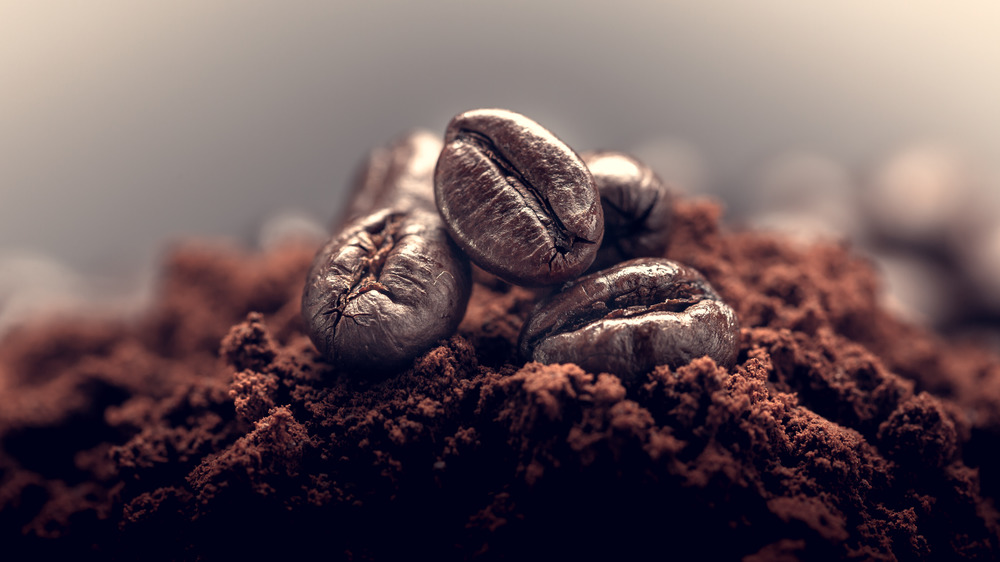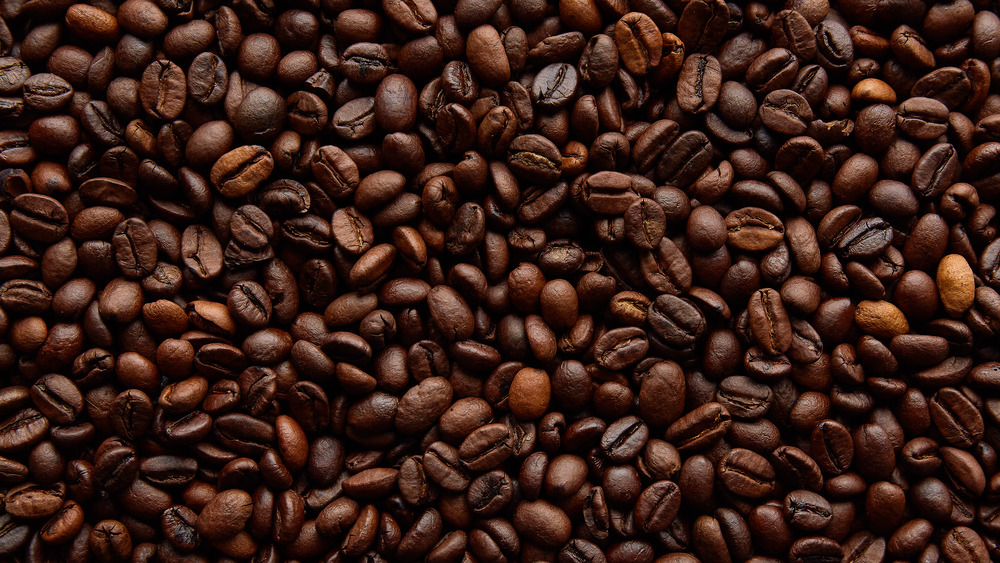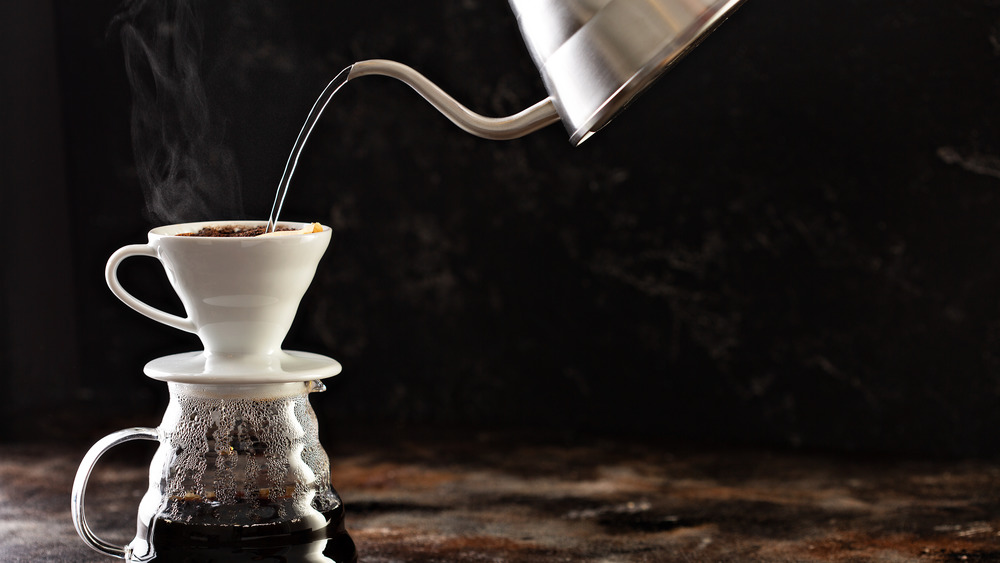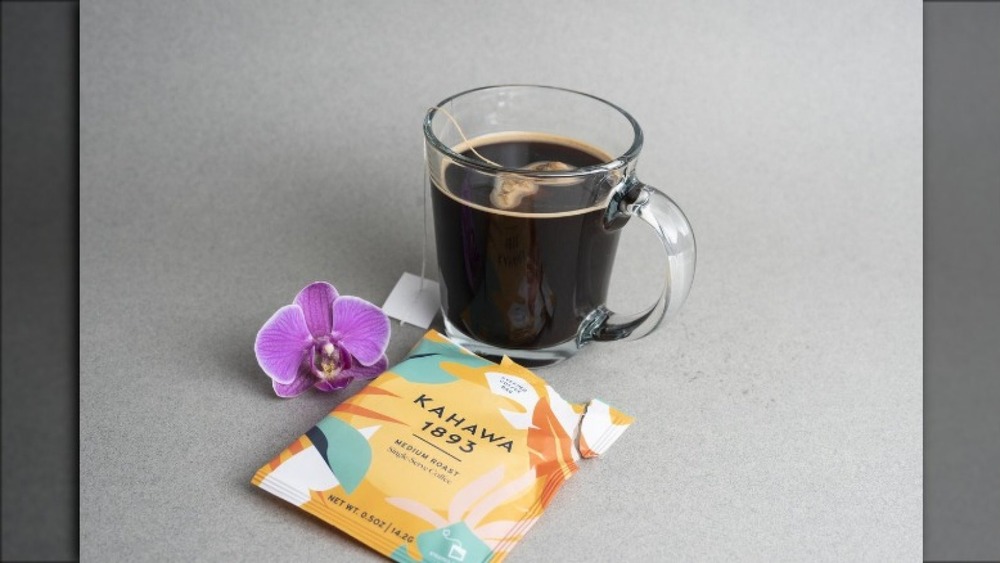Don't Buy Any More Ground Coffee Before Reading This
Nothing gets the morning started right like beginning the day with a cup of our favorite coffee. Whether we count ourselves as die-hard coffee fanatics or casual drinkers who just want a boost of caffeine to get us going, we have a love affair with the drink that shows no sign of stopping. According to E-Importz, the U.S. imports over $4 billion worth of coffee every year to keep us going, with Americans drinking 400 million cups of the black stuff a day. With a devotion this strong, it makes sense that we should show some love to coffee, especially if we drink it every day.
When it comes to making coffee at home, we can take our caffeine game to the next level by grinding whole beans, rather than relying on pre-ground coffee from the store. According to Homegrounds, this style of coffee tastes better and helps us appreciate a well-made cup of coffee that much more. To discover the secrets that grinding at home holds, Mashed asked Margaret Nyamumbo to help clear up all the mysteries. Nyamumbo, a third-generation Kenyan coffee farmer and owner of Kahawa 1893, explained that pre-ground coffee normally gets made from defective beans.
"Coffee comes in many different quality levels, and less than five percent of coffee is considered specialty coffee," Nyamumbo said. "A little-known secret in the industry is to use 'defective' beans for ground coffee since consumers won't get an opportunity to inspect the beans, unlike when you buy whole bean coffee."
Pre-ground coffee holds less flavor
If you choose to buy pre-ground coffee, you face more obstacles than just bad beans. "Once ground, coffee starts to oxidize and quickly loses the compounds that give coffee its aroma, sweetness, and complex flavors," Nyamumbo explained.
"This happens because when we grind coffee, a larger surface area is exposed to oxygen, which accelerates the degassing process. Degassing is a natural process by which coffee releases carbon dioxide accumulated during roasting. You want the coffee to lose some of the carbon dioxide but not all of it. We recommend a resting period for freshly roasted coffee to allow gases to be released, but not too long; there is a sweet spot."
Stale coffee has an obvious tell. "You can tell coffee is stale or has lost a lot of flavor if it tastes flat and doesn't produce any gas 'bubbles' during brewing, which signifies that there are not good gases left to enhance the flavor," Nyamumbo continued. "Gases also help release oils present in the coffee that are responsible for acidity and complex flavors."
Expect your grounds to lose flavor
Even in a perfect world where your beans didn't experience degassing, your pre-grounds still have some immediate vulnerabilities that can influence their taste. "In addition to oxygen, the coffee, once ground, is also exposed to other elements that accelerate loss of flavor — like moisture," Nyamumbo said. "Avoid storing ground coffee in the fridge or freezer. The temperature causes condensation that releases moisture to the beans."
The fridge can present some real dangers for your pre-ground coffee that whole beans don't experience. "Another reason not to refrigerate your ground coffee is to keep it from absorbing any other flavors of the food in your fridge," Nyamumbo said. "The larger surface area of ground coffee can absorb the flavor of other foods in the freezer. If you have onions or seafood, your coffee may taste a little funky."
These pre-ground coffees we can pick up at the store might work for drip coffee, but if you want to make a latte like your local cafe, you need a different grind size that you might not get from pre-ground coffee.
"If you enjoy brewing coffee using different methods like Espresso, Chemex, pour-over, French press, or coffee maker, you need different grind sizes to get the coffee's best flavor," Nyamumbo explained. "Ground coffee from the grocery store tends to be a one-size-fits-all and doesn't allow for the customization needed to transform a simple brew into a delightful pleasure."
Grind at home for a cafe experience
"If you are a coffee lover, a grinder is the best investment you will make to make your mornings unforgettable," Nyamumbo said. "There are many affordable options available. If you can, choose a Bunn grinder, as it's the best for grinding coffee evenly for a consistent extraction."
"Because ground coffee loses flavor so fast; roasters don't offer their most precious beans in ground form. These beans are best enjoyed freshly ground to the optimal size calibrated to maximize flavor extraction."
If you can't get a hold of a grinder, you can still make the most of your grounds. Margaret Nyamumbo recommends that we store our pre-ground coffee in an air-tight container to prevent moisture from getting in, buy our grounds from a local roaster or online specialty roaster to get high-quality grounds, and use individually-wrapped coffee that removes any threat of oxygen exposure and give us the best tasting cup of joe.
Next time you want to take your coffee to the next level, consider investing in a grinder to get the most out of your beans and start your morning in the best way possible.



